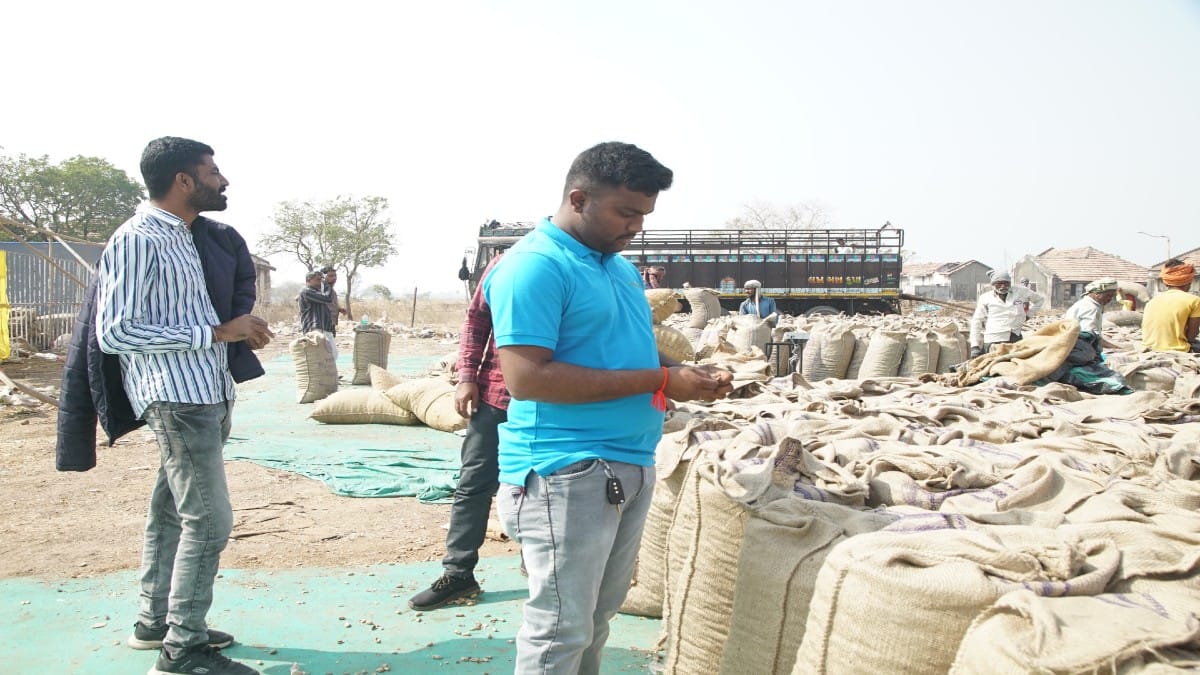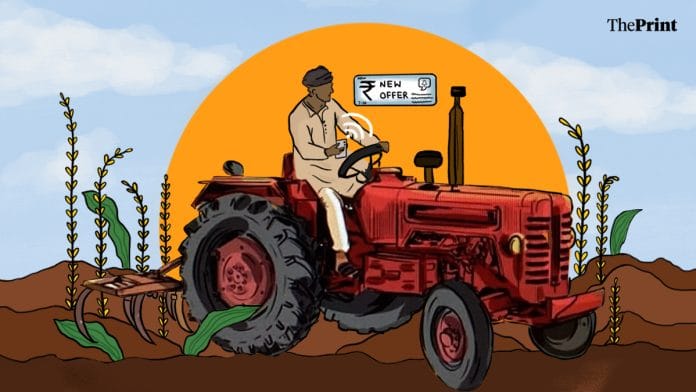Mumbai: Mukund Kumar gets a notification from an app on his phone with an offer for a certain quantity of grains. If the price is right, all he has to do is click a button to accept. If not, he can decide to wait for a better offer. More often than not, he’ll get a higher price.
The technology may make it seem like it, but Mukund is not some trader living in the city. He is a small wheat farmer from the interiors of Bihar.
He is also among the few farmers who have signed with the agritech companies that have come up over the past decade. There are a handful of such companies that operate at different scales, running grain banks and ‘buy and sell’ exchanges.
The agritech companies store grains for farmers close to villages at a small fee, mostly non-perishables such as wheat, maize, and paddy, with some companies even covering cereals, pulses and oilseeds.
It helps farmers sell the produce at a better profit in the future and make a sale at the convenience of a click. Some of these companies also use the stored harvest as collateral to lend money to the farmers so they can start a fresh sowing cycle in the meantime.
All of this trade takes place over a digital platform to which the farmers who sign up with these agritech firms have access.
So, unlike most farmers in India who struggle to find a market for their surplus at a desired price, Mukund is now spoiled for choice.
“The advantage is that when I store, if I need money I can get a loan easily. About six months later I get a better rate,” said Mukund. For the past three years, he has been storing his produce with Ergos, an agritech firm that works directly with farmers.
Also Read: India hits back in WTO over allegations that it supports domestic farmers more than permitted
Moving focus from production to marketing
Mukund, who has a 20-acre farm in Chakmehsi village, Samastipur district, deposits his harvest at the Ergos warehouse in his village in May and sells it sometime around December for a 5-10 percent profit.

“Every farmer brings a different quality of grains. We have figured out how to standardise the quality, put it together in one warehouse,” Kishor Jha, Ergos chief executive officer, told ThePrint. “If the farmer needs a loan, they can get a loan against their grains stored with us, and they can wait to sell their 20-30 bags at a time when the market is favourable.”
Ergos deals directly with the farmers and stores any amount of grain—even a single bag. Among the other such prominent agritech companies, there is Arya.ag, which works with Farmer Producer Organisations (FPOs) as well as StarAgri, which offers its warehousing facilities for FPOs as well as traders, millers, processors and corporates.
Sangeeta Shroff, a Maharashtra-based researcher who has specialised in agricultural economics, told ThePrint that what the agritech companies are is similar to what the Union government was attempting under its now-repealed farm laws.
“The farm laws had many issues, one was contract farming, multiple markets, you could sell outside the states. But, the common thing is that the farm laws wanted to promote marketing and this model of agritech companies is also to promote marketing, which is the need of the hour,” Shroff said.
“For the first 4-5 decades after India gained Independence, we only spoke about production. Now, the entire issue has moved to marketing.”
Shroff said farmers need good storage and easy access to institutional financing to avoid distress sales, and while right now, only a handful of farmers may be using such services, this is the way forward.
“Agritech companies can accumulate large amounts and deal with a big processor or retailer. As of now, it is a drop in the ocean, but the way people went from cash to online payments, this can happen too. But, the system needs to be well governed and the storage needs to be of a high quality,” she added.
Produce, store, sell, profit
Ergos CEO Kishor Jha grew up as the son of a small farmer in Bihar’s Madhubani district. His father would struggle to find a good price for his surplus in the market.
“I come from a very humble background. We have seen many challenges during our childhood. My father used to cultivate 30 quintals of wheat where 20-odd quintals used to be surplus, and he would struggle to sell it in the open market,” Jha told ThePrint.
The agritech company’s chief operating officer, Praveen Kumar, is also from an agricultural background but was on the other end of the spectrum. He comes from a large farmer landlord family.
“His family owned 400-500 acres of land. Hundreds of farmers used to work on his land but they would struggle to put together funds to pay his family the rent,” Jha said.
He added that India is a country of marginal farmers who make about Rs 50,000 to Rs 70,000, and not all at one go.
“Unfortunately, in India’s agritech boom, hardly anyone is touching the life of farmers who have just 20 bags of grains at their doorstep. All the infrastructure is to serve the larger players,” Jha said.
Ergos started in 2012, while Praveen Kumar came on board in 2013. The company started its work from Kumar’s village, Akhtiyarpur, in the Samastipur district of Bihar by first speaking to farmers there, trying to find out why they were not even able to pay the rent.
Eventually, Ergos established its first warehouse and observed its learnings. Today, it has about 150 grain banks in villages across the country with a storage capacity of 500 to 800 tonnes. It charges farmers a rent of Rs 45 paise per quintal per day for storage. Farmers can store their harvest with Ergos for a maximum of nine months at a time.
The company is expecting a revenue of about Rs 300 crore in the current fiscal, two thirds of which comes from its business in Bihar. The rest comes mainly from Karnataka, followed by Maharashtra.
Preventing distress sales
Since Ergos deals directly with farmers, its pool of clients has only seen a modest growth to about 10,000-12,000 farmers in the past ten years.
On the other hand, Arya.ag, which works with FPOs, can claim that it works with a million farmers.
“When we started off people scoffed at us saying you want to work with farmers, closer to the farm gate, you will lose your money,” Prasanna Rao, co-founder and CEO of Arya.ag told reporters during an interaction last month.
“But, farmers are willing to participate in market-led models if it is cost effective,” he said, adding Arya.ag now effectively aggregates 3 percent of India’s total grain production through its platform.

The company conducted an internal study according to which 79 percent of the farmers who used its services reported that their income increased by at least 15-20 percent and they were able to prevent distress sales.
Rao said, the biggest fear of FPOs while participating in this kind of a model is the sudden fall of prices.
“This is a big barrier for farmers in participating in such models. We created a price guarantee structure where in the exceptional circumstance if the prices go down, your prices are locked, you cannot incur a loss,” he said.
Arya.ag, which started in 2013, also has a majority of its business—about 30 percent—in Bihar though it has a presence across multiple states, including Madhya Pradesh, Maharashtra and Rajasthan.
Integrated lenders
Before Rajesh Kumar, another Bihar-based farmer, started using Ergos about five years ago, he used to attempt to store his wheat and maize on his own, waiting for the market price to improve.
“I couldn’t store for a very long time. There used to be a lot of problems with moisture, pests, and fungus,” Rajesh Kumar said. He harvests his wheat in May and maize in June-July. Rajesh also had to rely on local money lenders to get fresh loans.
Subscribing to Ergos’s services helped him solve both problems—store without the risk of damaging his produce and get easier access to finance.
Until now, other than land, house and jewellery, Jha said nobody had come up with any asset class that could be monetised. With the advent of agritech companies, that has changed. Farmers can now monetise the asset class most dear to them—their produce—for fresh loans.
Allowing farmers to use their produce as collateral, agritech companies have integrated lenders on their platform. They digitise the harvest stored with them, get it valued, and inform the lender, who immediately disburses the loan.
Arya.ag has about Rs 25,000 crore worth of commodities stored on its platform every year, against which loans of about Rs 11,000 crore are disbursed, the company said in the call with reporters in January.
Of this, the company has itself disbursed about Rs 2,000 crore in loans, while Rs 9,000 crore have been disbursed by its 31 different partner banks.
“We have to act as a business correspondent with banks. It takes time because banks are not used to these small ticket sizes for loans. 42 percent of our customers are first-time borrowers who have never accessed institutional credit before,” Rao said.
And when a farmer such as Mukund decides to press that button and enter into a sale agreement for his harvest, the agritech company pares off his loan with the proceeds from the transaction. The surplus is the farmer’s profit.
(Edited by Sanya Mathur)
Also Read: In Punjab’s rejection of Centre’s agri marketing policy, another showdown over APMCs in the making






